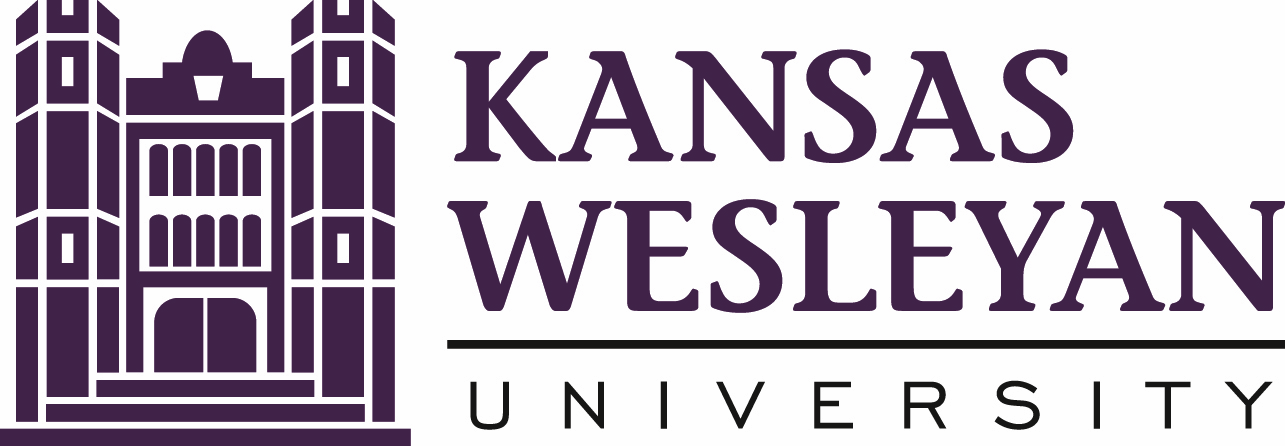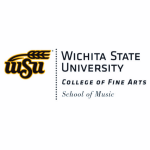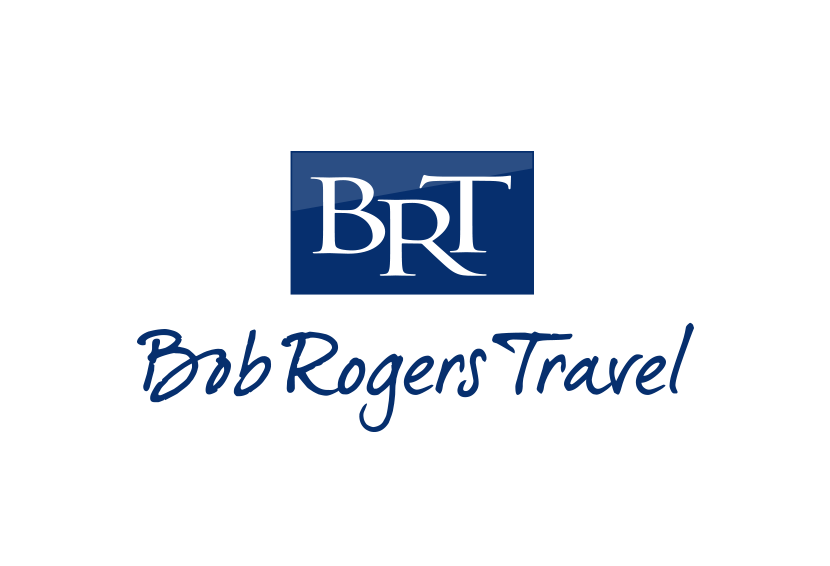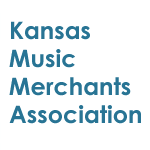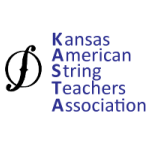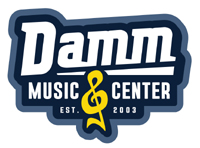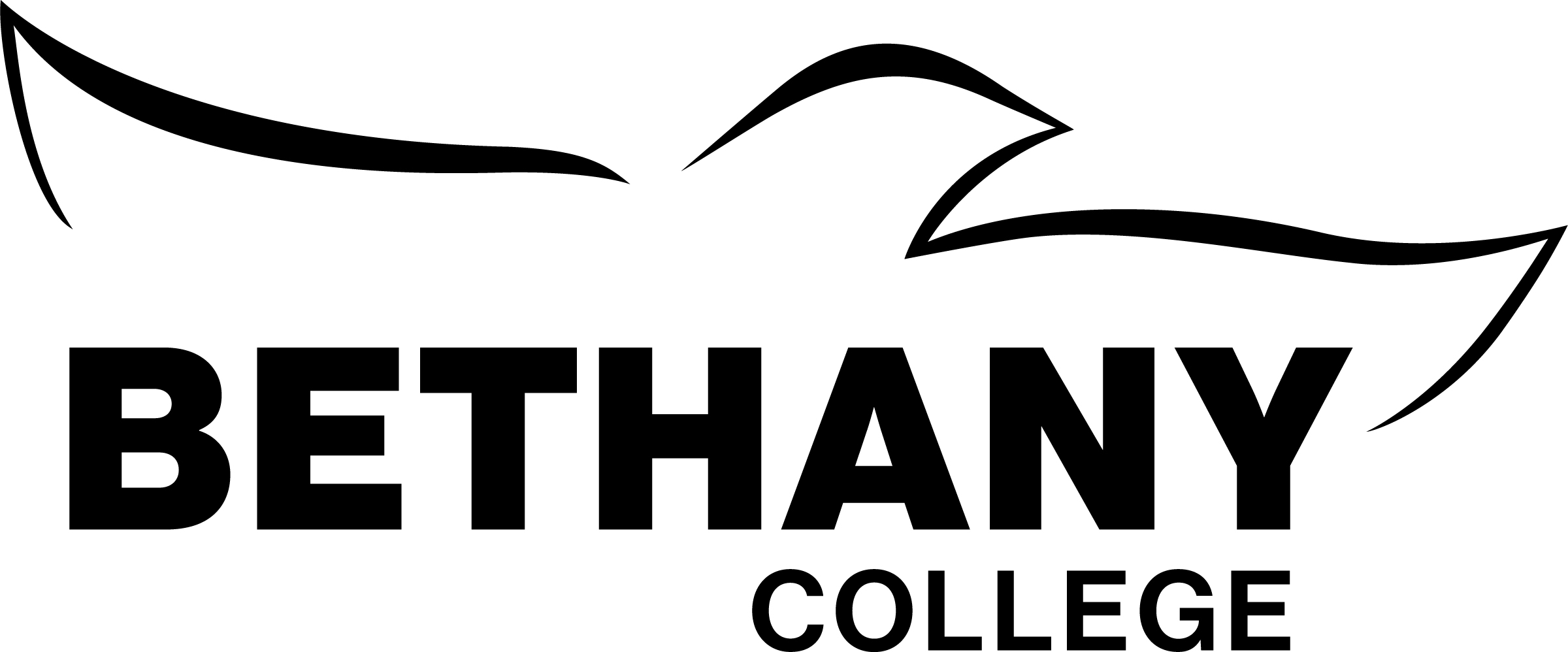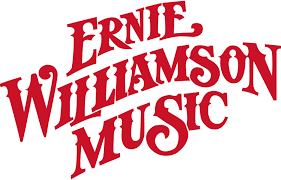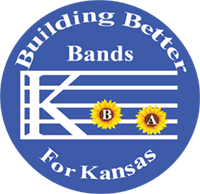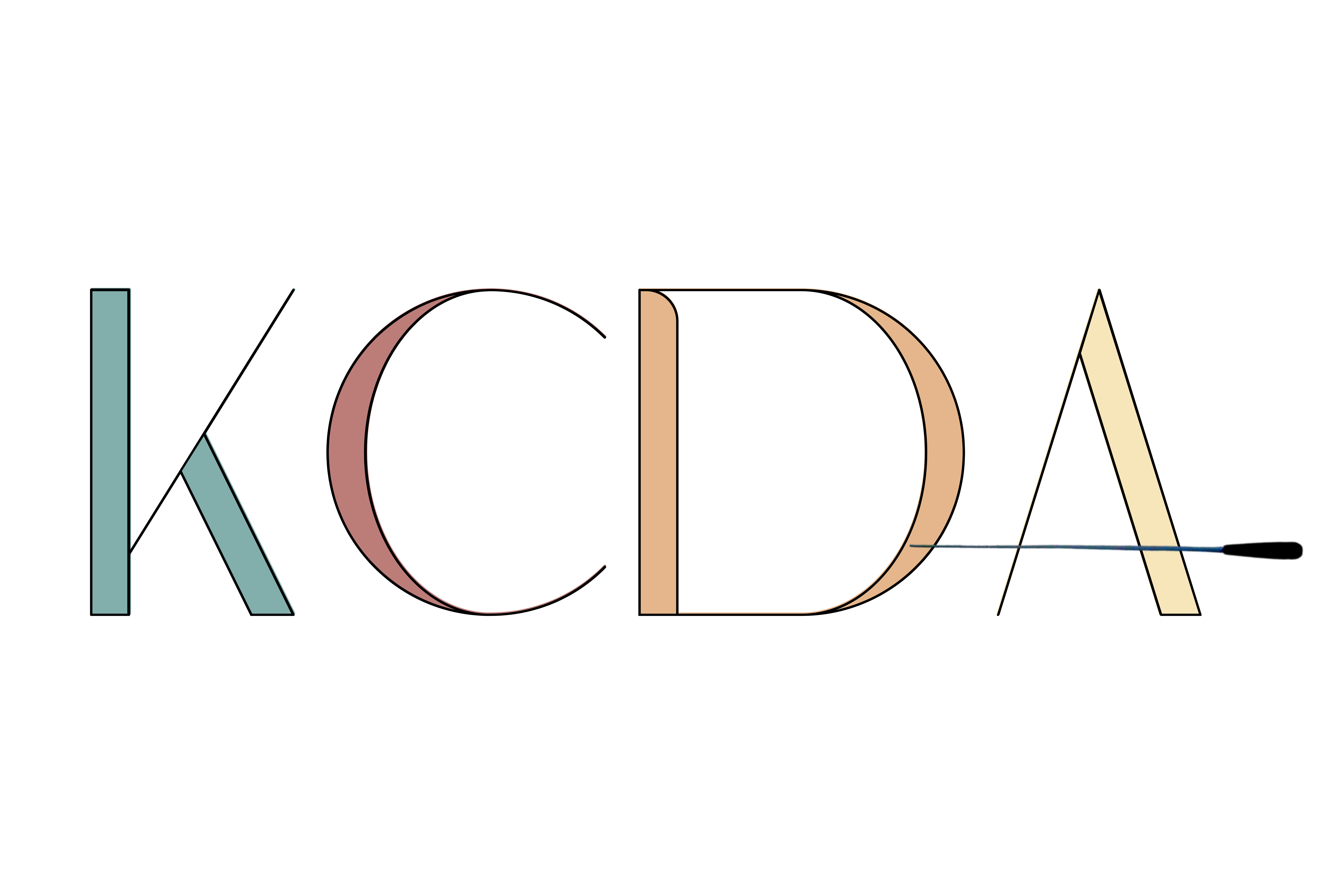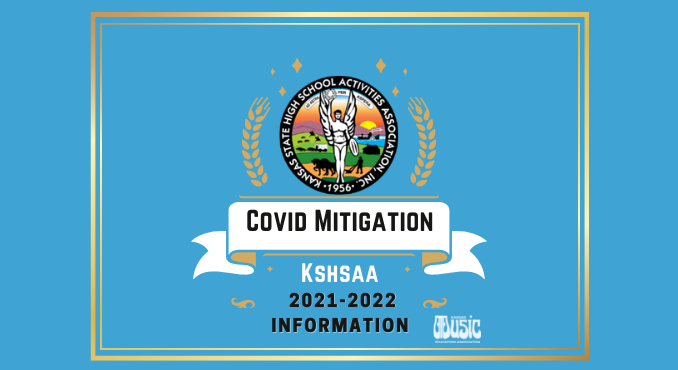
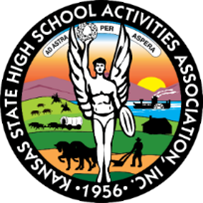
By Craig Manteuffel, KSHSAA Assistant Executive Director
Hello Kansas Music Teachers!
Congratulations teachers for all you did in 2020-21. You faced many challenges, but we found ways in 2020-21 to make sure our music programs continued to perform and be evaluated. I am hopeful that music educators and school administrators will continue to navigate the COVID-19 pandemic with science-based facts and mitigation strategies.
EVERYONE plays a role in school and community health!
KSHSAA COVID-19 MITIGATION INFORMATION 2021-2022 (July 2021)https://www.kshsaa.org/Public/pdf/COVIDInfo21-22.pdf
Participation in interscholastic activities benefits students, schools, and communities. School activities positively impact the physical, social, emotional, and mental health and development of students, support academic achievement and enhance school culture while providing pride across a community. In order for the benefit to be realized, as part of the 2021-22 school year, all stakeholders should support efforts for continued health. The impact of COVID-19 may have subsided, but experts warn it is not yet over and mitigating the risk of infection spread is still critically important during this school year.
All school personnel should stay abreast of current CDC and KDHE recommendations and implement the appropriate risk mitigation measures for their schools and activity programs. The KSHSAA has music education considerations based on the ongoing NFHS/CBDNA Aerosol Study. Below are important links to documents and web pages that should help steer your conversations with administrators, parents and students. Please be advised that we revise the KSHSAA documents as new information becomes available.
KEY RISK MITIGATION MEASURES TO CONSIDER IN SCHOOL ACTIVITIES
- Vaccination is currently considered the best way to prevent the spread of the virus and end the pandemic. This is also the best way to ensure your activity programs are not disrupted due to an outbreak.
- Students not feeling well should stay home and follow up with their healthcare provider to determine if testing is necessary.
- Continue to reinforce the benefits of good personal hygiene and respiratory etiquette among your students.
- Mask use indoors by those unvaccinated is still recommended by the CDC. This week the CDC has changed the language to include those that are vaccinated.
- Screening testing for unvaccinated participants is an option schools may consider. For more information, see the KDHE website: https://www.kdheks.gov/
- Unvaccinated students and staff should continue to follow the guidelines of the local health department and school district for quarantine protocols when an exposure or infection takes place.
International Coalition Performing Arts Aerosol Study (Updated Guidelines 7/9/21)
Dr. James Weaver (NFHS) and Dr. Mark Spede (CBDNA), Chairs
Dr. Shelly Miller, University of Colorado Boulder and Dr. Jelena Srebric, University of Maryland, Lead Researchersasedfgedsafd
As the United States continues the process of moving to post-pandemic conditions, questions about music activity abound. Many questions still exist for the fall and the beginning of the 2021-2022 school year. Although the United States is reaching a higher level of vaccinated adults, the vaccination rates for those ages 12-17 remains low. Importance will need to be placed on local and state respiratory disease transmission rates for use of mitigations. Depending on developments with respect to variants such as the Delta variant and other potential risk factor enhancements, these suggestions are meant to provide some best practices as we move out of the pandemic.
Outdoors: Outdoors remains the safest space. No mitigations needed depending on the level of local and state transmission rates.
Indoors: Indoor environments vary greatly:
•Masks- Masking with appropriate *material remains the best way of reducing potential infected aerosol from circulating in an indoor space. Masks are recommended to be worn while singing and speaking.
•Bell Covers- Bell covers made from appropriate *material remain the best way of reducing potential infected aerosol from circulating in an indoor space. Depending on your comfort level and local and county mandates, instrumentalists can wear masks only when speaking and slitted performance masks are optional.
•Rehearsal Times- In spaces with good ventilation rates and HEPA filtration, increased indoor rehearsal times of 50 minutes may be considered at 3 feet distancing. A minimum of 3 air exchanges per hour should be used. If there are spaces with higher air change rates, you may consider longer rehearsal times. Rehearsal longer than 50 minutes would require extending distance between students.
•Physical Distancing- Distancing may be decreased to 3 feet, adjusting farther or closer depending on local conditions.
•Hygiene- Continue good hygiene practice moving forward, including appropriate elimination of brass fluid.
•Face Shields and Partitions- Plastic face shields only stop large droplets, not aerosol; room dividers inhibit the function of the HVAC system and are not recommended.
*Material should consist of MERV13 material or ASTM F2100 (or similar) standard.
Important to note: assessing the Risk of Music Activities during the COVID-19 Pandemic leads to a chance of 1 in 1.9 million of contracting COVID in a music class. The research data shows aerosol disbursement mitigations for music classes is the best strategy to move us back to normal ASAP.
NFHS Music Committee (Craig Manteuffel, Chairperson)
- Big Things Project, Post Pandemic Resources for Administrators and Teachers
- https://www.nfhs.org/articles/return-to-music-resources-helping-teachers-administrators-students/
- Phase II was released in May (same link as Phase 1)
- Phase III is scheduled to be released in late July or early August https://www.nfhs.org/articles/return-to-music-resources-helping-teachers-administrators-students/
Music Teacher Shortage Across the Nation
As I meet with national state association leaders from across our country, it is very evident that most states are incurring a music teacher shortage. Below are State and National participation numbers for KMEA to use as we work together to address this issue in Kansas. KSHSAA will promote starting Tri-M Chapters during the KSHSAA annual rules meeting. Shelly Cole, KMEA Tri-M Music Honor Society Advisor, has provided KSHSAA with informational slides for this purpose. If you know of other ways that KSHSAA can help further, please reach out to me.
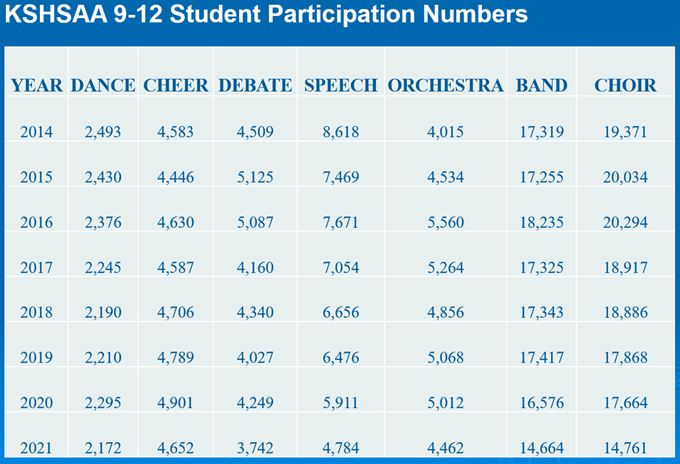
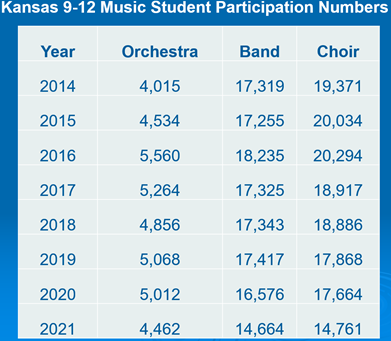
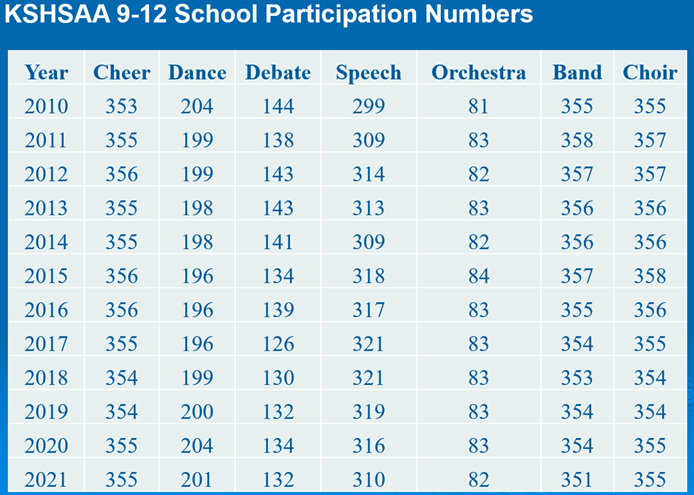
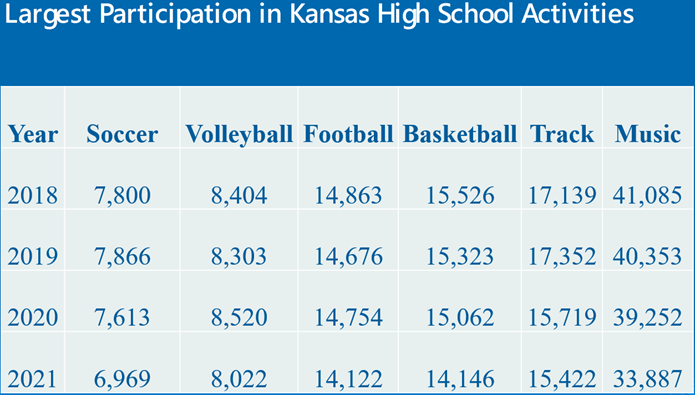
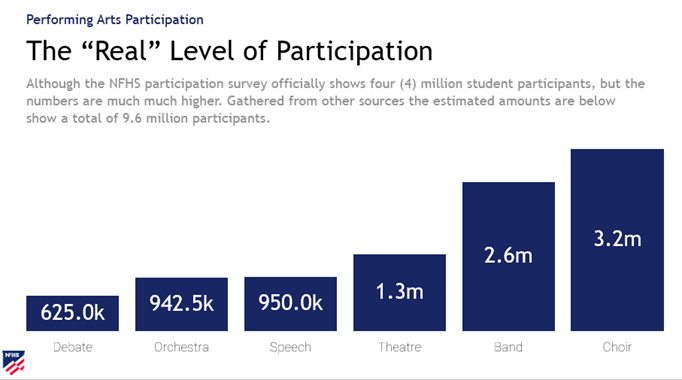
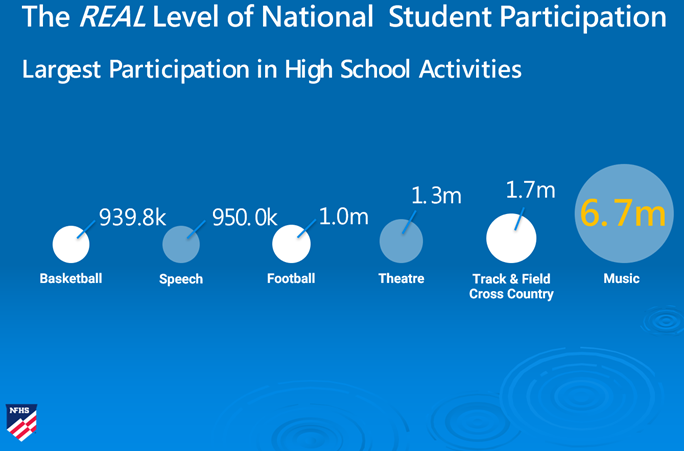
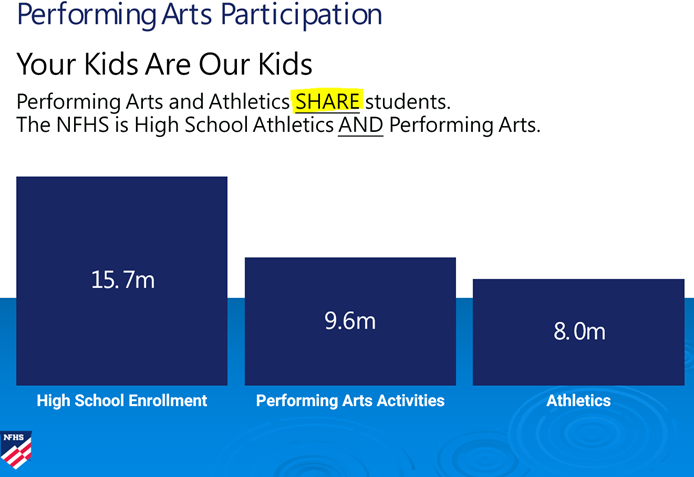
- KSHSAA Performing Arts School of Excellence Awards
Leadership from the KSCA, KMEA, KS Thespians, and KSHSAA met on July 7th in the KSHSAA office and finalized the award-winning schools for 2021-22. Thank you to KMEA President Gard and President-Elect Minneman for attending and contributing to the conversation. This fall we will award 1 winner, 5 finalists, and 30 commended schools. Certificates will be mailed on September 1, 2021.
Free Courses www.NFHSLearn.com
Understanding Copyright and Compliance
This course should be taken by ALL K-12 and College/University music teachers! Not complying with music copyright laws could potentially cost you and/or your school district $30,000 per infraction. You need to educate yourself on copyright laws and know what is legal and illegal. This course was written in partnership by the NFHS and NAfME.
Music Adjudication
Music adjudication provides an opportunity for performing arts students to develop by further improving their skills through constructive feedback. To help you as an adjudicator support the development of these skills, the NFHS has created the course Music Adjudication. This course has been designed to provide adjudicating basics and guidelines, teach you how to properly comment on and give constructive feedback on a performance, as well as further explaining the different roles in which you may serve as an adjudicator. Example student performances are included to give you an opportunity to practice adjudicating real performances while also providing guidance on what to note during a particular performance.
Introduction to Interscholastic Music
Designed to provide an overview of best practices in the music classroom and interscholastic music competitions.
The skills taught in this course introduce and reinforce time-tested guidelines and techniques that music educators of any level of proficiency can use in directing music programs across the United States. Although this course is useful at any point of a music teacher’s career, this course is best fit for music educators in their beginning years. Upon completion of this course, you will have the skills and knowledge necessary to develop the strategies and tools needed to be successful in the music classroom.
Interscholastic Music Event Management
Designed to provide an overview of management and best practices for hosting music events. These events provide a setting outside of the classroom for students to showcase their musicianship, creativity, critical thinking, collaboration, and communication skills. As a contest, festival, or honor group manager, you serve a crucial role in creating a positive and efficient environment for student success. The skills taught in this course introduce and reinforce time-tested guidelines and techniques that music event managers with any level of hosting experience can utilize to efficiently and successfully manage interscholastic music events.
Band Safety
Band provides a setting outside of the classroom for participants to showcase their musicianship, creativity, critical thinking, collaboration, and communication skills. In order for these objectives to be met, it is important to provide a safe environment for all participants in Band. To help you provide that safe environment, the NFHS has partnered with Music for All, Bands of America, WGI Sport of the Arts, Drum Corps International, and Varsity Athletic Bands to bring you “Band Safety.” This course addresses heat and other weather concerns, the value of hydration, rest and sleep, hearing protection, and other safety considerations.
Implicit Biases
Implicit Biases are the automatic reactions we have toward other people based on our past learning and expectations. Studies show that Implicit Bias affects the experiences of students in school athletic and activity programs. The NFHS has partnered with Project Implicit to bring you this course, Implicit Bias. Studies support that there is a relationship between implicit bias and real-world behavior, which highlights the importance of being aware of and managing your bias. This course defines and illustrates examples of Implicit Bias and provides research on how it impacts our society.
Student Mental Health and Suicide Prevention
It’s widely known that stress, anxiety and depression create challenges for both society and individuals, including interscholastic students. Severe conditions can lead to the worst outcomes, such as suicide. The NFHS is proud to bring you this course on Student Mental Health and Suicide Prevention in response to this reality. With a focus on wellness, including both physical and psychological, this course highlights causes, strategies and provides helpful resources.
Wishing you continued good health and great school year!

Craig Manteuffel
Assistant Executive Director of Fine Arts and Spirit
Kansas State High School Activities Association
C:\OneDrive\Kansas State High School Activities Association\KSHSAA Staff Portal – Company\Music\KMEA Correspondence KMR Articles\KMR Articles\KMR Article Fall 2021.docx


